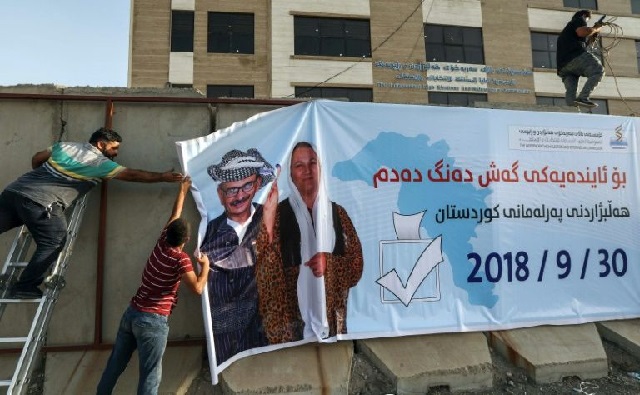
Today, the election posters lining the streets of regional capital Arbil ahead of Sunday's parliamentary vote are simply an annoyance to many Kurdish voters, angry at their leadership and the economic crisis deepened by the September 2017 poll.
"They are spending crazy money on printing campaign posters," said Abdullah Mohammed, a 69-year-old retiree. "But when people in need ask for help, they say there's a crisis and there's no money."
Twelve months since a controversial referendum that sparked a punishing backlash from Baghdad, Iraq's divided Kurds will elect a regional parliament Sunday, their dreams of statehood shattered.
Still smarting from referendum, Iraqi Kurds to elect new parliament
"These elections don't interest me at all," Mohammed said, a black and white kuffiyeh scarf on his head.
Last year's poll, held in defiance of the international community, sparked anger and a firm rejection from the Iraqi capital.
It also deepened the divide between the Kurdistan Democratic Party (KDP) of longtime regional leader Massud Barzani, who championed the referendum, and the Patriotic Union of Kurdistan (PUK).
Less than three weeks after the vote, federal forces moved in to oust PUK forces that were controlling the disputed province of Kirkuk.
The provincial governor, who had supported the KDP-backed referendum, took to the airwaves to call people to arms — even as PUK forces withdrew without a fight.
Iraqi President Fuad Masum, a PUK member, blamed the referendum for triggering the assault on Kirkuk, whose rich oil resources would have been essential to the survival of a Kurdish state.
Barzani, who stepped down shortly after the poll, indirectly accused the PUK of "high treason" for withdrawing.
The episode exposed the deep split between the two parties that dominate Kurdish politics.
Despite the backlash sparked by the referendum, the fact that three million Kurds voted for independence will have major implications for the election, according to Adel Bakawan, director general of the Kurdistan centre of sociology at Soran University near Arbil.
Iraqi Kurdish leader says 'yes' vote won independence referendum
"By portraying themselves as victims of an international and regional system that prevents the Kurds entering history by founding their state, the separatists are hoping to win back those votes," he said.
The KDP has already reaped the rewards of its separatist stance, winning 25 seats in May elections to the Iraqi national parliament, making it the top party from the Kurdistan region, he said.
Party officials are upbeat.
"All the signs indicate that the KDP will dominate and win by a landslide" on Sunday, said Sobhi al-Mandalawi, a high-ranking party member in Arbil.
The stranglehold the two heavyweights have over Kurdish politics means smaller parties are excluded from decision-making, Bakawan said.
That has created distrust that could prompt record levels of abstention, he said.
That will likely prolong the PDK's grip on power, according to Abdulrazaq Sharif of the Goran (Change) movement, set up in 2009 to challenge the monopoly of the two main parties, which it accuses of corruption.
"Goran wants to see Kurds play a real role in the central government," he said.
Wahid Kurdi, a 57-year-old former Peshmerga fighter from Arbil, said the regional government's key priority should be the wellbeing of "Kurds who are suffering in Kirkuk" and other disputed areas.
"Once they're in parliament, MPs must not forget the disputed zones," he said. "They should work to bring them back inside the borders of Kurdistan."
In the autonomous region's second city Sulaimaniyah, Ahmed Bashdari, 65, said he plans to vote— "for those who don't put Kurdistan in danger"— and urged leaders to rebuild the bridges damaged by the referendum.
Leaders in Kurdistan and Baghdad "must make concessions so their conflicts stop damaging people's lives," he said.
1731570357-0/elon-musk-(1)1731570357-0-405x300.webp)
-(1)1717678110-0/Kendrick-(1)-(1)1717678110-0-165x106.webp)





1732445375-0/Untitled-design-(9)1732445375-0-270x192.webp)


1732428810-0/Copy-of-Untitled-(3)1732428810-0-270x192.webp)






COMMENTS
Comments are moderated and generally will be posted if they are on-topic and not abusive.
For more information, please see our Comments FAQ